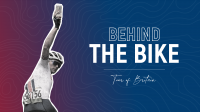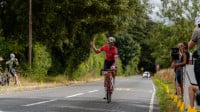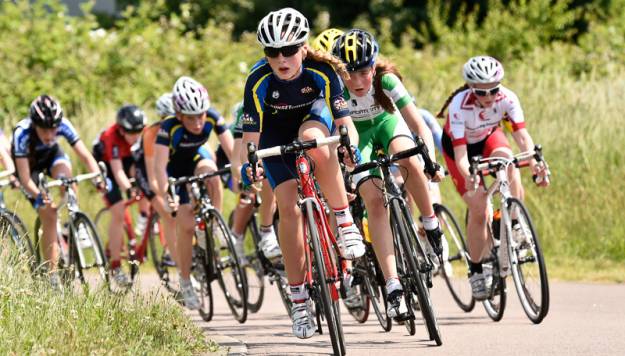Tour Watch
Stage 4 - Tuesday, July 7 2009: Montpellier - Montpellier (TTT) 39 km | Results
Members Know Best: British Cycling's members know the sport better than anyone and we're inviting you to share your thoughts on this Tour de France - use the comments section at the bottom of this page, or email them to editor@britishcycling.org.uk
Team-work
Team-work was the theme of the fourth stage of the 2009 Tour de France. Whilst the need for teamwork in the Team Time Trial is obvious, the stage also raised broader questions about the importance of team-work in winning the Tour de France.
The stage itself saw the Astana team put in a fine team effort, covering an awkward and at times technical 39km course in 46m 29s. That put them 18s clear of Garmin Slipstream, with Team Saxo Bank third at 40s. After all the arithmetic had been done, the result left Saxo Bank's Fabian Cancellara still in yellow, but only by 22 hundredths of a second from, perhaps inevitably, Lance Armstrong.
Several leading contenders lost a lot of time. Cadel Evans' Silence Lotto team finished 2m 26s down, whilst Denis Menchov's Rabobank team fared little better, losing 2m 21s. Both riders also missed out on the break Lance Armstrong slipped into on the previous stage, so both now face a deficit of over 3 minutes on the American. Carlos Sastre fared a little better, his Cervelo Test Team losing 1m 38s, but even he faces a 2 minute deficit to Armstrong.
For those new to the Team Time Trial, the basic principle is that each team races separately against the clock in a nine-rider formation, not dissimilar to an elongated team pursuit formation. The riders share the workload, just as they do in the Team Pursuit, spending time working hard at the front of their team's line before moving to the back of the line to recuperate.
Teams record a time based on that of their fifth rider to cross the finishing line. This makes up to four riders "expandable" on the stage and less able time trial riders are routinely dropped. These weaker time trial riders (often sprinters or climbers) aim to give the team some strong turns at the front before sacrificing themselves to the greater good. Team-work and self sacrifice are therefore the order of the day. At the end of the stage, all the riders in the team are given the same time, which is added to their times for the other stages. A strong rider in a weak, poorly-drilled team has much to lose.
So far so good then for Armstrong. His team is full of brilliant time trial specialists and it showed as they held formation well and kept the majority of their riders contributing for most of the stage. They deserved their stage win and Armstrong was perhaps a little unlucky to miss out on the yellow jersey.
However, the strength of the Astana team threatens to become its greatest weakness. Coming into the race the brilliant young Spaniard Alberto Contador, winner of this race in 2007 and widely recognized as the best stage race rider in the world, was being touted as their team leader. He was the rider whom the rest of the team would support in his efforts to win the race overall.
However, four days into the race, and with only yesterday's slightly freakish 40 second gain over Contador to work with, Lance Armstrong is suddenly talking about the team having several potential team leaders, including the Germa Andreas Klöden and the American Levi Leipheimer. He is openly admitting he wants to win the race and referred to the "delicate situation in the team." He added that the "race will develop its true form in the mountains" and that "Alberto (Contador) came to win and so did I!"
The race may develop its true form in the Pyrenees, but Lance Armstrong seems to be showing his true form already. He plainly has serious ambitions to win the event.
What a contrast to the ethos Armstrong engendered in the teams which helped him win seven Tours. He demanded, and received, utter loyalty from his eight team-mates and rewarded them with those seven straight wins. No other team had previously dedicated their entire efforts to one man in such a way. Armstrong - and his team manager Johan Bruyneel - revolutionized the tactics of winning a three week tour, though it's interesting to see that no other team has tried to copy their "all eggs in one basket" approach.
Astana have the strength in depth of the best US Postal and Discovery Teams which helped Armstrong to those historic wins. But they currently lack the single-mindedness and unquestioning dedication to one shared goal. Ironically, that seems to be down to Lance himself.
The plot thickens and we seem set for some fascinating racing. But, for once, some of the most interesting competition may well be within a single team.
Members Know Best:
We asked British Cycling members to email in with their comments on the race. We also asked who they thought would win the event:
Rob W. emailed us with this: "Armstrong is fooling himself if he thinks he can win the Tour again. He's got two things against him - age and the effects of the lengthy break he took from top cycling. Either of those alone would stop a lesser man from winning, but combined, they will stop even Armstrong. His ego won't let him see this. It's Bruyneels' biggest test as a DS to sort out the mess within the team. He needs to do it before the team hit the mountains of they will implode!"
Your Turn: If you want to share your thoughts on this Tour de France - use the comments section at the bottom of this page, or email them to editor@britishcycling.org.uk








